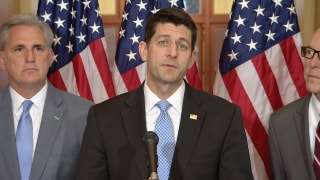The Volokh Conspiracy
Mostly law professors | Sometimes contrarian | Often libertarian | Always independent
Conservative and libertarian health care experts pan GOP's "Obamacare lite" plan

On Monday, congressional Republicans rolled out their new health care plan, which is supposed to "repeal and replace" Obamacare. Donald Trump hailed "our wonderful new Healthcare Bill." But his enthusiasm for the proposed American Health Care Act is not widely shared. In addition to the expected critiques from the left, the bill has been forcefully condemned by a wide range of conservative and libertarian health care experts. These leading critics of Obamacare argue that the GOP proposal is just as bad, and possibly even worse.
Michael Cannon, well-known health care analyst for the libertarian Cato Institute, offered a particularly harsh appraisal, denouncing the new bill as "Obamacare lite or worse":
This bill is a train wreck waiting to happen… The Obamacare regulations it retains are already causing insurance markets to collapse. It would allow that collapse to continue, and even accelerate the collapse….
Republicans don't seem to have any concept of the quagmire they are about to enter with this bill….
If this is the choice, it would be better if Congress simply did nothing.
As Cannon explains,the new GOP plan has a similar structure to Obamacare, fails to address most of its flaws, and may well make some of them worse. Republicans should take note: If one of Obamacare's leading critics concludes that your "repeal and replace" bill is even worse than Obamacare, and worse than doing nothing, that's a pretty damning indictment.
Other right of center economists and health care experts have offered similarly damning assessments, including Megan McArdle, Peter Suderman, Scott Sumner, and Avik Roy.
Roy argues that the proposal includes some valuable reforms for Medicaid, but concludes that this benefit is outweighed by the many harmful aspects of the plan. Suderman's bottom line is even more negative: "In general, it's not clear what problems this particular bill would actually solve."
I am no fan of Obamacare myself, and was involved in helping develop the constitutional case against it that led to the Supreme Court's controversial ruling in NFIB v. Sebelius. But I find it sobering that even many of the ACA's toughest critics fear that the GOP alternative is likely to be worse.
A crucial point emphasized by many of these critics is that the GOP plan does little or nothing to constrain health care costs or open up the insurance industry to wider market competition. As Cannon puts it, "Congress needs to enact reforms that make health care more affordable, rather than just subsidize unaffordable care." The GOP plan, he explains, does mostly the latter, often even more inefficiently and coercively than Obamacare.
McArdle points out that the new plan is as much a "gigantic Rube Goldberg contraption" as Obamacare is. She also notes that the GOP hopes to use many of the same procedural tricks to disguise its flaws as Democrats did with those of the ACA. It is far from clear they will manage to get away with it.
Because the plan is so enormously complicated and has so many moving parts, it could easily unravel in a wide range of unexpected ways, as the different components fail to interact as expected. For reasons F.A. Hayek famously explained, even the wisest of bureaucratic central planners lack the knowledge to foresee and offset such problems. And today's Republican Party is not exactly overflowing with wisdom and competence.
If the GOP plan falters like Obamacare has, its flaws will be exacerbated by another feature the two policies have in common: lack of bipartisan support. If it gets through Congress at all, the AHCA is likely to pass on a strict party-line vote or close to it, just like the ACA. From the standpoint of the opposition party, the optimal political strategy will be sit back, watch the trainwreck happen, and saddle the party that passed the plan with the blame.
Just as Republicans had no incentive to help Obama fix the flaws in the ACA, so Democrats will have no incentive to help fix problems with the new GOP plan. Partisan bias is a powerful and increasingly pernicious force, and it could potentially undermine the GOP's health care policy. Admittedly, Democratic opposition may not matter much if the Republicans expand their congressional majorities in 2018 and 2020. But recent history suggests that neither party can count on controlling Congress for long. And in the Senate, many bills are subject to filibuster, effectively requiring 60 votes to pass.
This entire sorry state of affairs is even more the fault of congressional Republicans than Donald "nobody knew health care could be so complicated" Trump. These people had seven years to come up with an alternative to Obamacare, and so far their work product is far from impressive. Sad! Nonetheless, Trump's ignorance, reckless statements, and disdain for free market ideas have also contributed to the problem.
Despite GOP control of both houses of Congress, there is a very real chance that the new bill will not pass. It has already come under fire from both conservative and moderate wings of the party. Given the narrowness of the 52-48 Republican majority in the Senate and the unyielding opposition of Democrats, the plan will be defeated if even as few as three Republicans defect.
In fairness, given the divisions within the party, it is not an easy task to cobble together a bill that is both an improvement over Obamacare and acceptable to all the key factions within the GOP. Whether Republicans can overcome these problems and come up with something better than this initial effort remains to be seen. At this point, it is hard to be optimistic.


Show Comments (0)